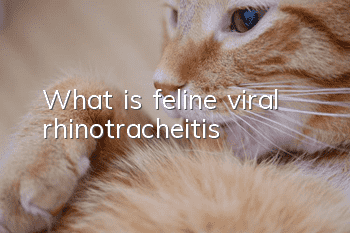What is feline viral rhinotracheitis?

Feline viral rhinotracheitis is an acute, highly contagious upper respiratory tract infectious disease, also known as infectious rhinotracheitis. It is an acute, highly contagious upper respiratory tract infectious disease that mainly affects cats. The incidence rate can reach 100% and the mortality rate is about 50%.
Methods of transmission of feline rhinotracheitis:
1. Contact transmission
This is the most important mode of transmission of feline viral rhinotracheitis . The virus is excreted through secretions from the nose, eyes, and mouth. Sick cats and healthy cats are infected through the respiratory tract through direct nose-to-nose contact and inhalation of virus-containing droplets. This type of transmission is most common in cat shelters, breeding farms, or places where there are several cats in the home, so if one cat in these places gets the disease, the other cats are likely to be affected as well. Well, this is the case with the cat of the eldest sister mentioned at the beginning.
2. Indirect transmission
Feline viral rhinotracheitis virus can contaminate the surrounding environment such as furniture, water dishes, food dishes, and cats when cats sneeze or cough or saliva. When other healthy cats come into contact with these virus-contaminated things such as sand trays, cages and walls, they will be infected and become ill. The virus can also be transmitted to other cats through the carrying effect of people and their clothing, so in When taking your cat to an animal hospital for medical treatment or to a grooming shop, you must be careful that the cat is indirectly infected in these places. In addition, after returning home from these places or pet markets, owners must change their clothes immediately and take disinfection measures before interacting with the cats at home. touch.
3. Maternal transmission
Feline viral rhinotracheitis virus can be transmitted from female cats to kittens through the placenta, so cats with this disease cannot become pregnant.
- How old should kittens be vaccinated and dewormed?
- What to do if your cat vomits hairballs
- Will anything happen if a cat licks external anthelmintics?
- What should I do if my cat always urinates? In fact, the solution is very simple!
- Why do kittens meow before peeing?
- Why do blue cats have white hair?
- Advice on raising a cat: Don’t raise a cat like this, it is suffering
- What to do if you are scratched by a kitten. You can wipe the wound with alcohol.
- How to tell the age of your cat
- Can cats take a bath in winter?



